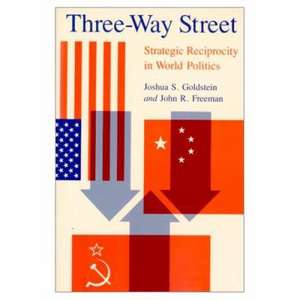Three-Way Street: Strategic Reciprocity in World Politics
Autor Joshua S. Goldstein, John R. Freemanen Limba Engleză Paperback – 30 apr 1990
How can the world's most powerful nations cooperate despite their conflicting interests? In Three-Way Street, Joshua S. Goldstein and John R. Freeman analyze the complex intersection defined by relations among the United States, the Soviet Union, and China over the past forty years.
The authors demonstrate that three major schools of international relations theory—all game-theoretic, psychological, and quantitative-empirical approaches—have all advocated a strategy that employs cooperative initiatives and reciprocal responses in order to elicit cooperation from other countries. Critics have questioned whether such approaches can model how countries actually behave, but Goldstein and Freeman provide a wealth of detailed empirical evidence showing the existence and effectiveness of strategic reciprocity among the three countries between 1948 and 1989. Specifically, they establish that relations among the three countries have improved in recent decades through a "two steps forward, one step back" pattern. Their innovative and remarkably accessible synthesis of leading theoretical perspectives brilliantly illuminates the nature and workings of international cooperation.
The authors demonstrate that three major schools of international relations theory—all game-theoretic, psychological, and quantitative-empirical approaches—have all advocated a strategy that employs cooperative initiatives and reciprocal responses in order to elicit cooperation from other countries. Critics have questioned whether such approaches can model how countries actually behave, but Goldstein and Freeman provide a wealth of detailed empirical evidence showing the existence and effectiveness of strategic reciprocity among the three countries between 1948 and 1989. Specifically, they establish that relations among the three countries have improved in recent decades through a "two steps forward, one step back" pattern. Their innovative and remarkably accessible synthesis of leading theoretical perspectives brilliantly illuminates the nature and workings of international cooperation.
Preț: 148.93 lei
Preț vechi: 184.22 lei
-19% Nou
Puncte Express: 223
Preț estimativ în valută:
28.50€ • 29.72$ • 23.69£
28.50€ • 29.72$ • 23.69£
Carte indisponibilă temporar
Doresc să fiu notificat când acest titlu va fi disponibil:
Se trimite...
Preluare comenzi: 021 569.72.76
Specificații
ISBN-13: 9780226301594
ISBN-10: 0226301591
Pagini: 254
Ilustrații: 24 line drawings, 13 tables
Dimensiuni: 152 x 229 x 15 mm
Greutate: 0.32 kg
Ediția:1
Editura: University of Chicago Press
Colecția University of Chicago Press
ISBN-10: 0226301591
Pagini: 254
Ilustrații: 24 line drawings, 13 tables
Dimensiuni: 152 x 229 x 15 mm
Greutate: 0.32 kg
Ediția:1
Editura: University of Chicago Press
Colecția University of Chicago Press
Notă biografică
Joshua S. Goldstein is associate professor of international relations at the University of Southern California. John R. Freeman is professor of political science at the University of Minnesota.
Cuprins
List of Figures and Tables
Acknowledgments
Introduction: An Outline and Rationale
1. Theories of Cooperation
Game-Theoretic Approaches
Prisoner's Dilemma Games and the Tit-for-Tat Strategy
Applications to International Relations
Evaluation of Game-Theoretic Approaches
Psychological Approaches
Psychological Theory and GRIT
Images and Expectations in International Relations
Evaluation of Psychological Approaches
Quantitative-Empirical Approaches
Richardson's Model and Negative Grievances
Quasi-Experimental Studies of International Politics
Evaluation of Quantitative-Empirical Approaches
Elements of Strategy
Cooperation and Reciprocity
Policy Inertia
Triangular Strategy
Toward a Better Understanding of Great Power Strategies
2. Sino-Soviet-American Relations, 1948-87
Measuring Cooperation and Hostility
The Three Events Data Sets
Criticisms of Events Data
A Quantitative History of Relations
U.S.-Soviet Relations
U.S.-Chinese Relations
Soviet-Chinese Relations
Long-Term Trends in Sino-Soviet-American Relations
3. The Reality of Reciprocity
Modeling Strategic Behavior
Vector Autoregression
Overview of the Data Analysis
Results of Specification Analyses
Patterns of Strategic Response
Bilateral Responses
Triangular Responses
Policy Inertia
Conclusion
4. Six Cooperative Initiatives
Zhou's Bandung Initiative (April 1955)
The Initiative
The Course of Events
Zhou's Trip to Eastern Europe (January 1957)
The Initiative
The Course of Events
Johnson's Gestures of Goodwill (October 1966)
The Initiative
The Course of Events
Nixon in China (February 1972)
The Initiative
The Course of Events
Gorbachev's Testing Moratorium (July 1985)
The Initiative
The Course of Events
Gorbachev's Vladivostok Speech (July 1986)
The Initiative
The Course of Events
Some Lessons
5. Evaluating Cooperative Strategies
Testing Alternative Strategies
Results
Theories of Cooperation Revisited
Game-Theoretic Studies of Cooperation
Psychological Studies of Cooperation
Toward a Unified Theory of Cooperation
6. Toward Lasting Cooperation
The Late 1980s
Is Cooperation Evolving?
The Next Step
A Limited Reciprocity Regime
Soviet "New Thinking"
Toward Three-Way Cooperation
Appendix A. Data Listing
Appendix B. Technical Results
Notes
References
Index
Acknowledgments
Introduction: An Outline and Rationale
1. Theories of Cooperation
Game-Theoretic Approaches
Prisoner's Dilemma Games and the Tit-for-Tat Strategy
Applications to International Relations
Evaluation of Game-Theoretic Approaches
Psychological Approaches
Psychological Theory and GRIT
Images and Expectations in International Relations
Evaluation of Psychological Approaches
Quantitative-Empirical Approaches
Richardson's Model and Negative Grievances
Quasi-Experimental Studies of International Politics
Evaluation of Quantitative-Empirical Approaches
Elements of Strategy
Cooperation and Reciprocity
Policy Inertia
Triangular Strategy
Toward a Better Understanding of Great Power Strategies
2. Sino-Soviet-American Relations, 1948-87
Measuring Cooperation and Hostility
The Three Events Data Sets
Criticisms of Events Data
A Quantitative History of Relations
U.S.-Soviet Relations
U.S.-Chinese Relations
Soviet-Chinese Relations
Long-Term Trends in Sino-Soviet-American Relations
3. The Reality of Reciprocity
Modeling Strategic Behavior
Vector Autoregression
Overview of the Data Analysis
Results of Specification Analyses
Patterns of Strategic Response
Bilateral Responses
Triangular Responses
Policy Inertia
Conclusion
4. Six Cooperative Initiatives
Zhou's Bandung Initiative (April 1955)
The Initiative
The Course of Events
Zhou's Trip to Eastern Europe (January 1957)
The Initiative
The Course of Events
Johnson's Gestures of Goodwill (October 1966)
The Initiative
The Course of Events
Nixon in China (February 1972)
The Initiative
The Course of Events
Gorbachev's Testing Moratorium (July 1985)
The Initiative
The Course of Events
Gorbachev's Vladivostok Speech (July 1986)
The Initiative
The Course of Events
Some Lessons
5. Evaluating Cooperative Strategies
Testing Alternative Strategies
Results
Theories of Cooperation Revisited
Game-Theoretic Studies of Cooperation
Psychological Studies of Cooperation
Toward a Unified Theory of Cooperation
6. Toward Lasting Cooperation
The Late 1980s
Is Cooperation Evolving?
The Next Step
A Limited Reciprocity Regime
Soviet "New Thinking"
Toward Three-Way Cooperation
Appendix A. Data Listing
Appendix B. Technical Results
Notes
References
Index
